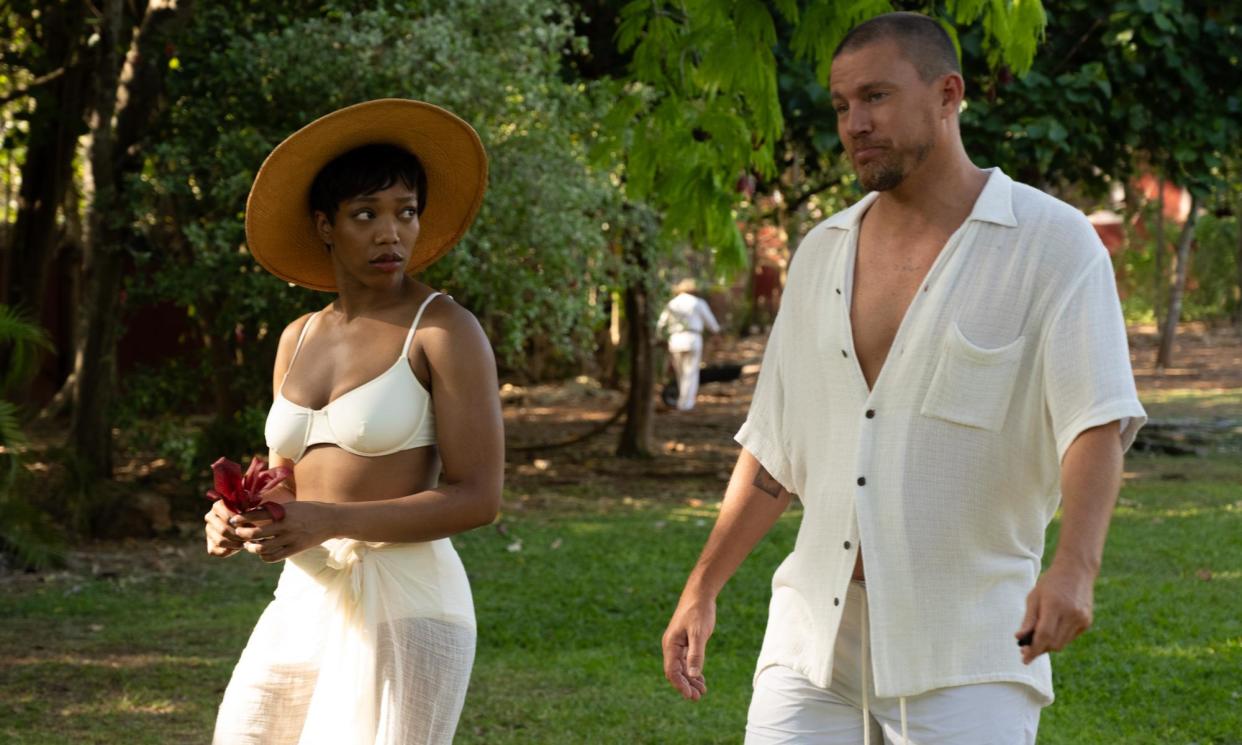Blink Twice review – Zoe Kravitz’s stylish yet scattered #MeToo thriller

For her directorial debut, Blink Twice, actor and reluctantly labelled nepo baby Zo? Kravitz has arrived at the table with a plate that’s stacked precariously high. It’s a tart, topical thriller sat in a Venn diagram between the many recent “eat the rich” satires (a subgenre that’s taken us from the heady highs of Triangle of Sadness to the limp lows of Saltburn) and the post-Get Out #MeToo-inflected social thrillers (from the overrated Promising Young Woman to the underrated Fresh). It’s also about contemporary horror’s favourite buzzword, “trauma”, and also inspired by Jeffrey Epstein and his private island. It’s about misogyny and abuse and memory and materialism and gender performance and many other things that would be a spoiler to mention. It’s therefore less of a plate and more of a buffet, and while it might be beautifully served, it’s a film about excess that suffers from it too, a case of too much leaving us with too little.
Related: The Supremes at Earl’s All-You-Can-Eat review – female friendship saga falls flat
It would be more tempting to praise Kravitz’s ambition as a writer-director (the script is co-written by her High Fidelity collaborator ET Feigenbaum) if the film didn’t feel so very, at times eye-rollingly, reminiscent of other recent films and if it didn’t arrive at what one hopes is the end of those aforementioned cycles. Like most attempts to repeat Jordan Peele’s lightning strike, it works best on the most base of terms, as a poppy and visually alluring date night thriller than it does as the finger-wagging dissertation it inevitably becomes.
Naomi Ackie, who suffered through 2022’s heinous Whitney Houston biopic, is Frida, a perma-tired cater waiter who dreams of a glitzier life she covets on Instagram, where she struggles to get followers for her nail design account (Kravitz cleverly uses doom-scrolling as introductory exposition). But luck changes in an instant when she and best friend Jess (Alia Shawkat, doing her thing but doing it well) con their way into an extravagant gala and into the inner circle of disgraced billionaire Slater King (Channing Tatum). He’s stuck in an apology cycle for some undefined act of impropriety and has retreated to a private island, a place where he invites the women for a no-brainer getaway with his friends and employees (including Christian Slater, Simon Rex and a well-observed assistant, played wonderfully by Geena Davis).
It’s a sudden jolt of everything Frida has admired from afar and we too find ourselves seduced by the luxury of it all. Kravitz knows this world well (she grew up in it, after all) and, together with cinematographer Adam Newport-Berra (developing quite the résumé with this, The Last Black Man in San Francisco and Euphoria), she makes it all believably impossible to resist. There’s a neat exaggeration in the film’s sound design, overemphasising every crackle of ice in a drink or every thin slice of early morning sashimi or, most effectively, every freshly poured glass of champagne.
But the long days by the pool which turn into debauched nights of drug-taking start to feel wearying, and while Frida tells others and herself that she is having a great time, she starts to worry that she really actually isn’t.
It’s a fun and propulsive enough mystery for the most part although I kept finding myself thirsting for some wittier, more specific dialogue (the jabs at vaping and wellness culture feel too broad and overdone) and, like the film it most often resembles – Don’t Worry Darling – some juicier conflict between the two sexes. Ackie makes for a rather absent lead, a fault not entirely of her own but also of a script far more interested in the male antagonist than the female protagonist. Tatum gets more of Kravitz’s attention (they are dating in real life) and he has fun riffing off a number of well-known figures while still making his character feel like more than carbon copy (although he struggles with some clumsy last-act speechifying). There’s also a magnetic, full-throated performance from Adria Arjona, following on from her charming turn in Hit Man, playing another woman on the island, one of deceptive survival skills learned from her time on an exploitative reality show. She’s the one to watch when the giddily cathartic violence begins.
As usual in this territory, it’s far easier to keep cards close to the chest than it is to reveal them and like so many similar films hinged on a Big Twist, the more we know the less we really understand. For a film so carefully curated – just the right song, just the right appetiser, just the right outfit choice – there’s a maddening lack of equal thought applied to the mechanics of the engine that is powering the whole thing (Kravitz and Feigenbaum needed a Homeland-sized corkboard and instead they used a cocktail napkin). The questions that had me banging my head against the wall by the end (and there really are so, so many of them) almost threaten to curdle the whole thing and had me wishing Kravitz had known her limits as a writer and simply given us a more pared-down survival thriller with the same guts and gore. The reveal is also one of such nightmarish horror that it makes elements of the surrounding film feel a little too flippant (the title change from Pussy Island makes sense now not just for marketing purposes but for a bigger sense of decency).
Kravitz pushes and prods but never really provokes in the ways she clearly wants to. For a film keen to exist on the cutting edge, Blink Twice could have used a sharper knife.
Blink Twice is out in US and UK cinemas on 23 August
